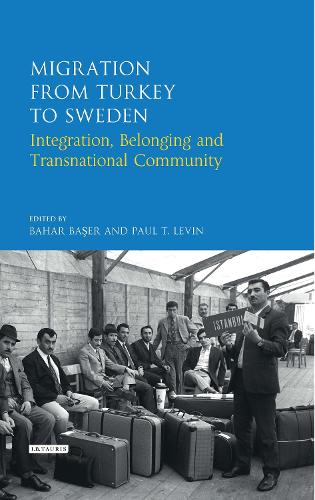
Migration from Turkey to Sweden: Integration, Belonging and Transnational Community
(Hardback)
Available Formats
Publishing Details
Migration from Turkey to Sweden: Integration, Belonging and Transnational Community
By (Author) Bahar Baser
By (author) Paul T. Levin
Bloomsbury Publishing PLC
I.B. Tauris
1st November 2017
United Kingdom
Classifications
Tertiary Education
Non Fiction
Migration, immigration and emigration
Middle Eastern history
Urban communities / city life
Refugees and political asylum
Political economy
304.84850561
Physical Properties
Hardback
320
Width 138mm, Height 216mm
515g
Description
The `refugee crisis' and the recent rise of anti-immigration parties across Europe has prompted widespread debates about migration, integration and security on the continent. But the perspectives and experiences of immigrants in northern and western Europe have equal political significance for contemporary European societies. While Turkish migration to Europe has been a vital area of research, little scholarly attention has been paid to Turkish migration to specifically Sweden, which has a mix of religious and ethnic groups from Turkey and where now well over 100,000 Swedes have Turkish origins. This book examines immigration from Turkey to Sweden from its beginnings in the mid-1960s, when the recruitment of workers was needed to satisfy the expanding industrial economy. It traces the impact of Sweden's economic downturn, and the effects of the 1971 Turkish military intervention and the 1980 military coup, after which asylum seekers - mostly Assyrian Christians and Kurds - sought refuge in Sweden. Contributors explore how the patterns of labour migration and interactions with Swedish society impacted the social and political attitudes of these different communities, their sense of belonging, and diasporic activism. The book also investigates issues of integration, return migration, transnational ties, external voting and citizenship rights. Through the detailed analysis of migration to Sweden and emigration from Turkey, this book sheds new light on the situation of migrants in Europe.
Reviews
`A balanced and insightful book that shatters clichs and raises awareness of the challenges of integration for both immigrants and native populations. - Rainer Baubck, Professor of Social and Political Theory, European University Institute, Florence, `This volume offers a richness of perspectives on a heterogeneous migrant diaspora. - Carl-Ulrik Schierup, Professor, Director of The Institute for Research on Migration, Ethnicity and Society (REMESO), Linkping University, Sweden, `As life itself, this book does not offer any simple answers, but it gives us valuable facts, background and exciting stories about a migration that has formed Sweden and its new inhabitants. - Jens Orback, Former Minister of Integration and Secretary General of the Olof Palme International Centre
Author Bio
Bahar Baser is a research fellow at the Centre for Peace, Trust and Social Relations at Coventry University and a visiting research fellow at the Security Institute for Governance and Leadership in Africa (SIGLA) at Stellenbosch University, funded by the National Research Foundation. She completed her PhD in social and political sciences at the European University Institute in Florence. Baer is the author of Diasporas and Homeland Conflicts (2015) and co-editor of Authoritarian Politics in Turkey (forthcoming 2017). She has various publications in peer-reviewed academic journals, including Terrorism and Political Violence, Ethnopolitics and the International Journal of Kurdish Studies. Paul T. Levin is the founding Director of the Stockholm University Institute for Turkish Studies (SUITS). Previously he served as Program Director for Governance and Management Training and taught International Relations at the Department of Economic History, both at Stockholm University. He received his PhD from the School of International Relations at the University of Southern California. Levin is the author of Turkey and the European Union: Christian and Secular Images of Islam and is a frequent commentator on Turkish affairs in Swedish and international media.
